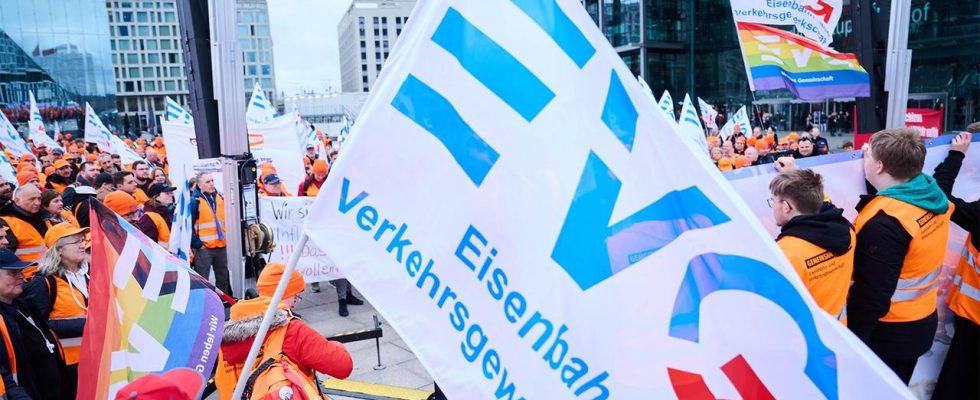faq
Do the EVG members accept the arbitrator’s decision in the collective bargaining dispute with Deutsche Bahn? Today the union announces the result of its ballot. In any case, the hurdles for an indefinite strike are high.
Will there be an indefinite strike on the rails in the next few weeks? This question is the focus today when the railway and transport union EVG in Berlin announces the result of its ballot. The likelihood that at least three-quarters of those taking part in the vote spoke out in favor of a day-long labor dispute at Deutsche Bahn is not all that high – but given the many critical voices about the alternative, it cannot be ruled out either.
The alternative is for the union to accept the arbitration award that was drafted in July. If 25 percent of those who took part in the vote voted in favor of the arbitration award, the collective bargaining conflict between EVG and DB should be over today – there is no threat of further strikes in this case.
How has the collective bargaining conflict at Deutsche Bahn gone so far?
The union and the railways have been arguing about a new collective agreement since the end of February. In the first round of negotiations, progress was very small – so the EVG put pressure on twice with warning strikes. A third warning strike was prevented by the labor court in Frankfurt am Main in mid-May.
After the court meeting, negotiations made much better progress, but ultimately collapsed at the end of June. A two-week arbitration process followed, with the result of the arbitration decision that is now available.
What is in this arbitration?
If the arbitration award is accepted, a good 180,000 employees at Deutsche Bahn will receive 410 euros more per month in two stages over a period of 25 months. The first stage of 200 euros is to be paid from December, the second from August of the coming year. In addition, all employees are to receive a tax and duty-free inflation compensation premium of EUR 2,850 in October.
Structural increases in the tariff tables were also agreed for individual professional groups after the end of the term. The incomes of a good 70,000 employees would thus increase significantly once again. After a heated discussion, the EVG federal board recommended that the members accept the arbitrator’s decision.
Could there be a strike after all?
The 75 percent hurdle for an open-ended industrial dispute is quite high. Above all, those 70,000 employees who are to benefit from the structural adjustments in the collective agreement should not have much interest in a strike. This would only lengthen the entire process further – the DB employees might not have more money in their accounts until next year. A top result for the arbitration award is also not to be expected.
Many dissatisfied union members have recently expressed their disappointment with the arbitrator’s verdict, for example on social media. The EVG went into the negotiations with the demand for 650 euros more for the 180,000 employees over a period of twelve months. The expectations were correspondingly high – the arbitrator’s verdict apparently does not meet them for everyone.
Difficult days are imminent for the EVG. If less than 50 percent vote in favor of the arbitrator’s verdict, it will most likely be accepted, but not supported by a majority within the EVG. A big risk.
Will labor disputes then be ruled out in 2023?
No, because collective bargaining with the much more offensive German Locomotive Drivers’ Union (GDL) and its boss, Claus Weselsky, will start in the fall. He wants to achieve 555 euros more per month for his people and a reduction in the weekly working time for shift workers from 38 to 35 hours. The inflation compensation premium is also one of his demands.
In recent years, negotiations between DB and GDL have often been tough. Trade union boss Weselsky usually does not save on public appearances with harsh allegations towards the DB board – only in June he had described the DB group as incapable of managing railway operations in Germany.
Weselsky has proved often enough that he is willing to enforce his demands with tough strikes. The peace obligation between the railways and the GDL ends on October 31st – after that the next tariff dispute begins.

